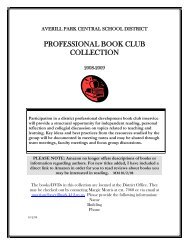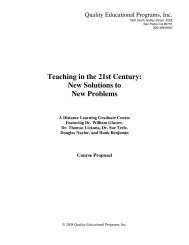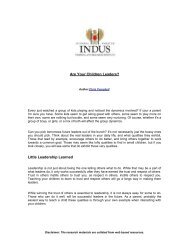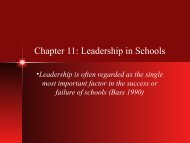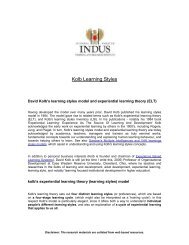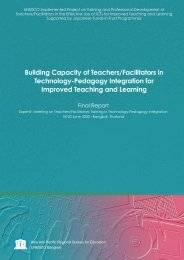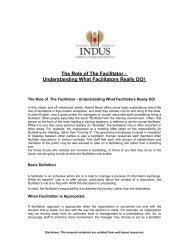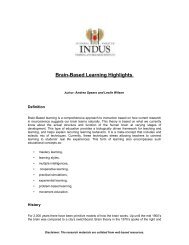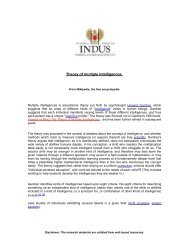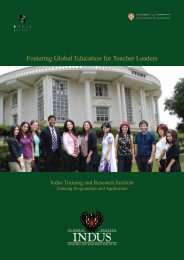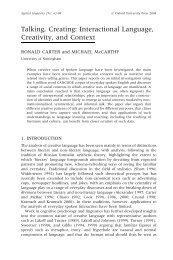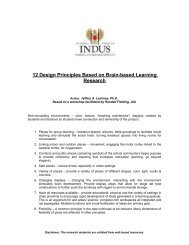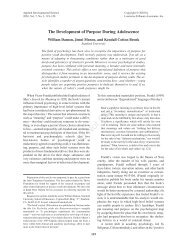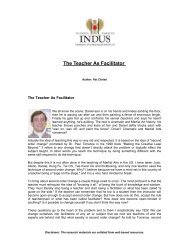Primary Years Programme Making the PYP happen - ITARI
Primary Years Programme Making the PYP happen - ITARI
Primary Years Programme Making the PYP happen - ITARI
- No tags were found...
You also want an ePaper? Increase the reach of your titles
YUMPU automatically turns print PDFs into web optimized ePapers that Google loves.
<strong>Making</strong> <strong>the</strong> <strong>PYP</strong> <strong>happen</strong><br />
Concepts: what do we want <strong>the</strong> students to understand<br />
Why include concepts as an essential element<br />
The decision to structure <strong>the</strong> <strong>PYP</strong> curriculum around important concepts or big ideas is driven by <strong>the</strong>se<br />
beliefs:<br />
! A good curriculum offers a balance between <strong>the</strong> acquisition of essential skills and knowledge<br />
and <strong>the</strong> search for meaning. Education is without meaning if students never really understand.<br />
! Education for understanding, with a focus on important ideas, has often been sacrificed to a<br />
superficial introduction to isolated facts and skills. The pressure to cover <strong>the</strong> syllabus and <strong>the</strong><br />
expansion of <strong>the</strong> curriculum have resulted in many students leaving school without ever really<br />
understanding.<br />
! By starting with <strong>the</strong> students prior knowledge, and by confronting and extending <strong>the</strong>ir early<br />
conceptions, we begin to promote real understanding.<br />
! The exploration and re-exploration of concepts lead students towards a sense of <strong>the</strong> essence of<br />
each discipline and an appreciation of ideas which transcend disciplinary barriers. If concepts<br />
are approached from a range of perspectives, students can gradually arrive at a deeper<br />
understanding.<br />
! Transdisciplinary units structured around concepts provide a context in which students can<br />
understand and, at <strong>the</strong> same time, acquire essential knowledge, skills and attitudes.<br />
In summary <strong>the</strong>n, <strong>the</strong> driving force at <strong>the</strong> heart of <strong>the</strong> <strong>PYP</strong> curriculum is a set of powerful ideas, or concepts,<br />
which we believe have great significance within each discipline and which transcend disciplinary barriers.<br />
These concepts provide a structure for <strong>the</strong> exploration of significant content. In <strong>the</strong> course of this<br />
exploration, students acquire and practise essential skills and reach a deep understanding of <strong>the</strong> concepts.<br />
Is it possible to identify a set of concepts around which to structure a<br />
curriculum<br />
Several years of research have been carried out involving <strong>the</strong> analysis of curricular models in use in<br />
different national systems and in international schools. This research has focused on, firstly, whe<strong>the</strong>r or not<br />
<strong>the</strong>re was a consensus on a set of concepts in which each has universal significance, and secondly, <strong>the</strong> status<br />
and role given to concepts in <strong>the</strong> various curriculum models. The results have led <strong>the</strong> <strong>PYP</strong> to conclude that<br />
<strong>the</strong>re are clusters of important ideas which can usefully be grouped under a set of overarching concepts,<br />
each of which has major significance, regardless of time or place, within and across disciplines.<br />
Having reached <strong>the</strong>se conclusions, <strong>the</strong> <strong>PYP</strong> has designed a conceptual framework for <strong>the</strong> curriculum,<br />
structured around a set of ideas or key concepts. It is realized that <strong>the</strong>se are not, in any sense, <strong>the</strong> only<br />
concepts worth exploring. On <strong>the</strong> contrary, <strong>the</strong> concepts which have been selected serve more as labels for<br />
clusters of interesting ideas. Taken toge<strong>the</strong>r, <strong>the</strong>y form a powerful set of ideas which drive <strong>the</strong><br />
teacher/student constructed research projects, <strong>the</strong> units of inquiry, which lie at <strong>the</strong> heart of <strong>the</strong> <strong>PYP</strong><br />
curriculum.<br />
© IBO 2000 13



